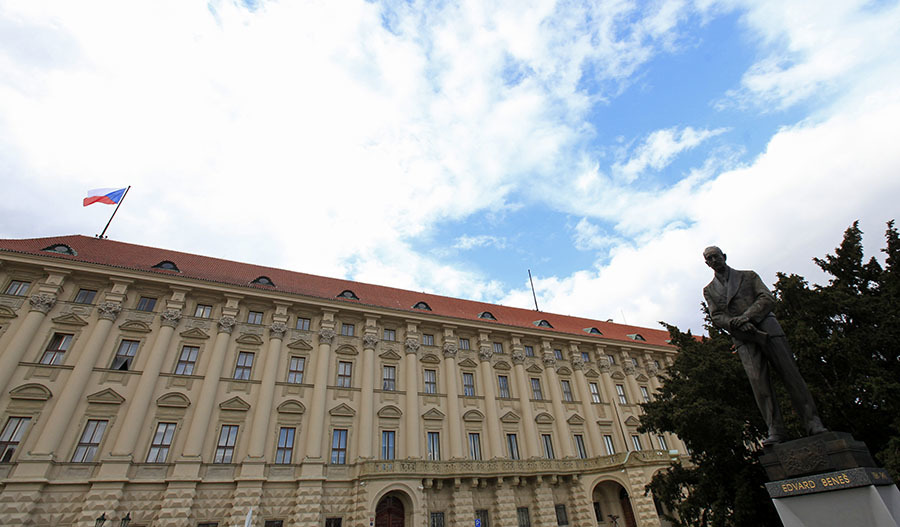Russia declared persona non grata to two employees of the Czech embassy. This was reported in the Russian Ministry of Foreign Affairs.
It is clarified that on June 15, the Czech Republic’s ambassador to Russia, Vitezslav Pivonka, was summoned to the Ministry of Foreign Affairs, who was informed of retaliatory measures in connection with the expulsion by Prague of Russian diplomats on June 5 “on the basis of absurd and unsubstantiated charges.”
“Guided by the principle of reciprocity, as well as article 9 of the Vienna Convention on Diplomatic Relations of 1961, two employees of the Czech Embassy in Moscow were declared persona non grata. They are ordered, together with family members, to leave the territory of the Russian Federation by the end of the day on June 17, ”the agency said.
The Foreign Ministry notified the Czech ambassador that this was a mirror measure in response to the provocative action of Prague, which was taken without any reason, "which the Czech authorities themselves admit."
“The announcement by them of a decision at the level of the country's Prime Minister A. Babish and Foreign Minister T. Petrsichek only confirms that the line to aggravate relations with Russia has now been elevated to the rank of state policy,” the foreign ministry emphasized.
The Foreign Ministry promised to take into account such a development in the general context of relations with the republic.
Speaking about the expulsion of Czech diplomats, Russian President’s press secretary Dmitry Peskov noted that the Kremlin is interested in establishing partnerships with the republic, but they cannot leave unfriendly actions of Prague unanswered.
Peskov emphasized that this principle applies to "all European states."
“The last months, indeed, let’s say so, have brought certain irritants to our bilateral relations. We regret in this regard, ”RIA Novosti quoted Peskov as saying.
- Czech Foreign Ministry building in Prague
- Reuters
- © David W Cerny
In turn, the Czech Foreign Ministry said that after the reciprocal expulsion of their diplomats from Moscow, they consider the problem that has arisen in relations with Moscow resolved.
A spokeswoman for the Czech Foreign Office, Zuzana Stihova, confirmed that the republic’s ambassador was notified that two people were declared undesirables.
“We are talking about the expected and symmetrical reaction to our steps of June 5 (the expulsion of two Russian diplomats from the Czech Republic). Thus, we consider the problem that arose not on the Czech side to be resolved, ”she said.
Recall that tensions between countries increased after the end of April, the Czech publication Respekt, citing unnamed sources, stated that in the early days of the month a man arrived in Prague with a Russian diplomatic passport, who was met by a Russian diplomatic mission vehicle. According to the material, he allegedly brought ricin poison with him, intended for the headman of the metropolitan area of Praha 6, Ondrzej Kolář, who initiated the dismantling of the monument to Marshal Ivan Konev, as well as for the mayor of Prague, Zdeněk Gr ,ib, who decided to rename the square in front of the Russian embassy in honor of the Russian opposition Boris Nemtsov.
In May, the online edition of Seznam Zpráv published material about a conversation with and. about. Andrei Konchakov, the head of the Rossotrudnichestvo’s representative office in the republic — he was allegedly the very same Russian diplomat who brought poison to the country. Konchakov denied the allegations, and the Russian embassy, in turn, stated that "because of the personal harassment of the diplomat deployed by the Czech media, threats began to come to him."
In the Kremlin, publications were called newspaper duck, and the Russian Foreign Ministry described the materials as fake and stuffing.
On June 5, Czech Prime Minister Andrei Babish announced the announcement of two employees of the Russian embassy as persona non grata, noting that the decision was made in connection with the story of allegedly transporting ricin to the Czech Republic. He said that, according to Czech authorities, the cause of the scandal was a “conflict” in the Russian embassy, during which one of the diplomats allegedly intentionally transmitted false information about impending poisoning to the country's special services.
Babis said that, in addition to unnecessary work for the special services, the officer created further problems in Czech-Russian relations and damaged Russia's reputation in the Czech Republic.
After that, Russian Foreign Ministry spokeswoman Maria Zakharova said that Moscow would take the expulsion of two Russian diplomats into account when interacting with the Czech Republic.

